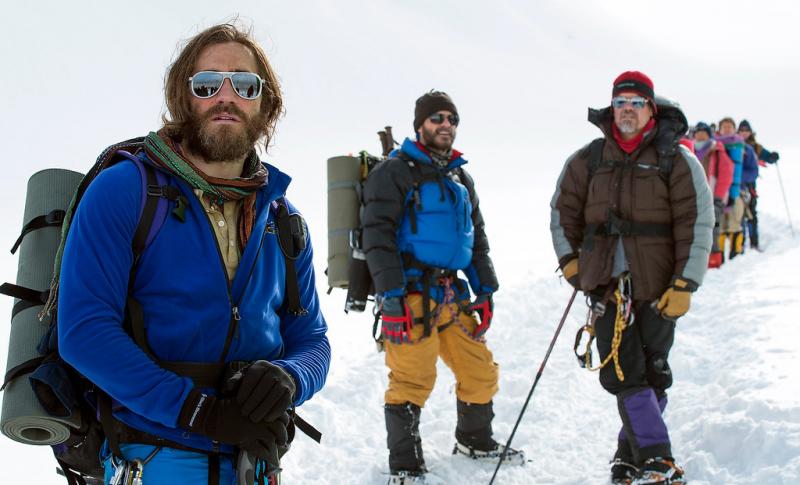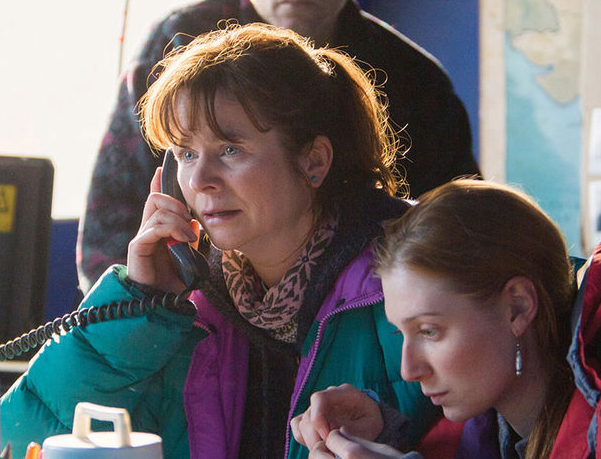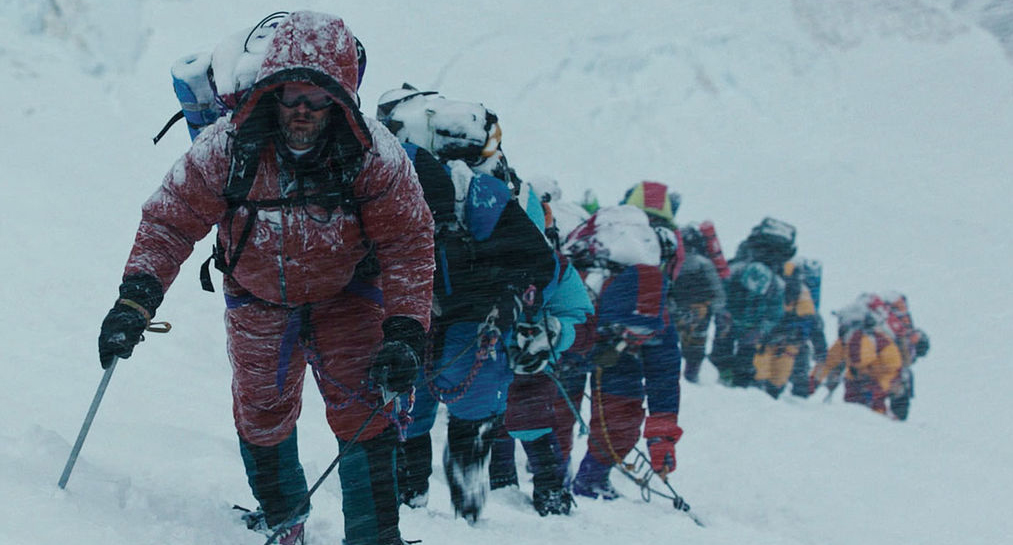Everest | reviews, news & interviews
Everest
Everest
Spectacle and tragedy in the Himalayan death zone

I don't usually suffer from chattering teeth and attacks of vertigo while watching a movie, but as this panorama of Himalayan disaster reached its climax I began to fear that I might need paramedics and an emergency evacuation. Everest might not top the all-time charts in terms of plot development or character psychology, but as an immersive account of a horrific chain of real-life events, it reaches – I nearly said "summits" – its objectives with distressing potency.
A shelf-load of books has been written by survivors about what happened on the world's most imperious mountain in May 1996, when no less than 20 climbing teams assembled in Nepal to take a shot at reaching Everest's 29,000-foot peak. Some of the facts and reasons for what happened can never be known, since they were lost along with the eight climbers who never came back. Despite this, screenwriters William Nicholson and Simon Beaufoy have constructed a clear and compelling account, which, in approved Disaster Movie style, gives the protagonists about as much human light and shade as the job requires without blocking the view to the summit (Emily Watson as Helen Wilton, pictured below).
 Scenes of Nepalese towns and temples help to convey the other-worldly nature of a trip to the Himalayas, but inevitably it's Everest itself which dominates the film, rearing up into the sky as both aspirational beacon – when the weather is so piercingly clear it's as if you can see all the way to outer space – and a terrible warning when the clouds start to roll in. These wildly contrasting conditions can succeed each with shocking speed, as the climbers discover when their tantalising window of mild weather is suddenly slammed shut by storms and blizzards. "The last word always belongs to the mountain," as Anatoli Boukreev, one of the climbing guides, warns.
Scenes of Nepalese towns and temples help to convey the other-worldly nature of a trip to the Himalayas, but inevitably it's Everest itself which dominates the film, rearing up into the sky as both aspirational beacon – when the weather is so piercingly clear it's as if you can see all the way to outer space – and a terrible warning when the clouds start to roll in. These wildly contrasting conditions can succeed each with shocking speed, as the climbers discover when their tantalising window of mild weather is suddenly slammed shut by storms and blizzards. "The last word always belongs to the mountain," as Anatoli Boukreev, one of the climbing guides, warns.
The film has been conceived for IMAX and 3D, and director Baltasar Kormákur (2 Guns, Contraband) has gone full tilt for mountainous shock-and-awe. Filmed in Iceland, the Italian Alps and on the lower slopes of Everest itself (where the second unit narrowly avoided a lethal avalanche last year), Everest convinces you that this must be what tackling the Big E is really like. The climbers' steep, debilitating climb through deep snow and thin air is painful to behold, while survival in the high-altitude "death zone", where the human body is in a state of shutting itself down, is depicted as a nightmare of bitter cold, howling wind and wracked lungs (and that's on a good day). Warnings from one of the expedition doctors about hypoxia and cerebral and pulmonary oedema prove well founded.
 But the flick would be meaningless without some believable human interactions, and there's scope for some solid performances. Jason Clarke brings a warming human touch to his portrayal of New Zealander Rob Hall (taking the lead, pictured above), boss of climbing company Adventure Consultants and a man acutely aware of his responsibilities to his clients (not least because they've paid $65,000 to come on the trip). His right-hand woman and base camp manager is Helen Wilton (Emily Watson, being both motherly and sergeant-majorish), and among his clients are macho Texan Beck Weathers (Josh Brolin) and journalist Jon Krakauer (Michael Kelly, from House of Cards). Krakauer subsequently wrote the book Into Thin Air. Hall enjoys a friendly rivalry with Scott Fischer, who runs the Mountain Madness company, and he's played by Jake Gyllenhaal like a benign climber-dude who'd look equally at home on a Harley-Davidson or a surfboard. Keira Knightley and Robin Wright are somewhat over-specified as the fretful wives of Hall and Weathers respectively.
But the flick would be meaningless without some believable human interactions, and there's scope for some solid performances. Jason Clarke brings a warming human touch to his portrayal of New Zealander Rob Hall (taking the lead, pictured above), boss of climbing company Adventure Consultants and a man acutely aware of his responsibilities to his clients (not least because they've paid $65,000 to come on the trip). His right-hand woman and base camp manager is Helen Wilton (Emily Watson, being both motherly and sergeant-majorish), and among his clients are macho Texan Beck Weathers (Josh Brolin) and journalist Jon Krakauer (Michael Kelly, from House of Cards). Krakauer subsequently wrote the book Into Thin Air. Hall enjoys a friendly rivalry with Scott Fischer, who runs the Mountain Madness company, and he's played by Jake Gyllenhaal like a benign climber-dude who'd look equally at home on a Harley-Davidson or a surfboard. Keira Knightley and Robin Wright are somewhat over-specified as the fretful wives of Hall and Weathers respectively.
Without getting all socio-political, Kormákur raises the issue of the over-commercialisation of Everest and the threat to the natural habitat, and the fatal foolhardiness of so many climbers stuck in a bottleneck queueing to go up speaks for itself. The film doesn't apportion blame for the tragedy, though Hall's too-sympathetic efforts to please a client backfire disastrously, while whoever it was who left empty oxygen bottles up the mountain where there should have been full ones committed a heinous blunder. Anyway, I always thought mountaineers must be nuts. Now I'm certain.
rating
Explore topics
Share this article
Add comment
The future of Arts Journalism
You can stop theartsdesk.com closing!
We urgently need financing to survive. Our fundraising drive has thus far raised £49,000 but we need to reach £100,000 or we will be forced to close. Please contribute here: https://gofund.me/c3f6033d
And if you can forward this information to anyone who might assist, we’d be grateful.

Subscribe to theartsdesk.com
Thank you for continuing to read our work on theartsdesk.com. For unlimited access to every article in its entirety, including our archive of more than 15,000 pieces, we're asking for £5 per month or £40 per year. We feel it's a very good deal, and hope you do too.
To take a subscription now simply click here.
And if you're looking for that extra gift for a friend or family member, why not treat them to a theartsdesk.com gift subscription?
more Film
 Little Trouble Girls review - masterful debut breathes new life into a girl's sexual awakening
Urska Dukic's study of a confused Catholic teenager is exquisitely realised
Little Trouble Girls review - masterful debut breathes new life into a girl's sexual awakening
Urska Dukic's study of a confused Catholic teenager is exquisitely realised
 Young Mothers review - the Dardennes explore teenage motherhood in compelling drama
Life after birth: five young mothers in Liège struggle to provide for their babies
Young Mothers review - the Dardennes explore teenage motherhood in compelling drama
Life after birth: five young mothers in Liège struggle to provide for their babies
 Blu-ray: Finis Terrae
Bleak but compelling semi-documentary, filmed on location in Brittany
Blu-ray: Finis Terrae
Bleak but compelling semi-documentary, filmed on location in Brittany
 Oslo Stories Trilogy: Sex review - sexual identity slips, hurts and heals
A quietly visionary series concludes with two chimney sweeps' awkward sexual liberation
Oslo Stories Trilogy: Sex review - sexual identity slips, hurts and heals
A quietly visionary series concludes with two chimney sweeps' awkward sexual liberation
 Sorry, Baby review - the healing power of friendship in the aftermath of sexual assault
Eva Victor writes, directs and stars in their endearing debut feature
Sorry, Baby review - the healing power of friendship in the aftermath of sexual assault
Eva Victor writes, directs and stars in their endearing debut feature
 Blu-ray: Who Wants to Kill Jessie?
Fast-paced and visually inventive Czech comedy
Blu-ray: Who Wants to Kill Jessie?
Fast-paced and visually inventive Czech comedy
 Oslo Stories Trilogy: Love review - freed love
Gay cruising offers straight female lessons in a heady ode to urban connection
Oslo Stories Trilogy: Love review - freed love
Gay cruising offers straight female lessons in a heady ode to urban connection
 Beating Hearts review - kiss kiss, slam slam
Romance and clobberings in a so-so French melodrama
Beating Hearts review - kiss kiss, slam slam
Romance and clobberings in a so-so French melodrama
 Materialists review - a misfiring romcom or an undercooked satire?
Writer-director Celine Song's latest can't decide what kind of film it is
Materialists review - a misfiring romcom or an undercooked satire?
Writer-director Celine Song's latest can't decide what kind of film it is
 theartsdesk Q&A: actor Leonie Benesch on playing an overburdened nurse in the Swiss drama 'Late Shift'
The Guildhall-trained German star talks about the enormous pressures placed on nurses and her admiration for British films and TV
theartsdesk Q&A: actor Leonie Benesch on playing an overburdened nurse in the Swiss drama 'Late Shift'
The Guildhall-trained German star talks about the enormous pressures placed on nurses and her admiration for British films and TV
 Freakier Friday review - body-swapping gone ballistic
Lindsay Lohan and Jamie Lee Curtis's comedy sequel jumbles up more than their daughter-mother duo
Freakier Friday review - body-swapping gone ballistic
Lindsay Lohan and Jamie Lee Curtis's comedy sequel jumbles up more than their daughter-mother duo

Comments
I saw a sneak preview in 3D